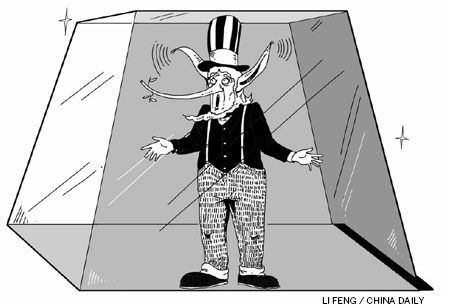Snowden storm stains US
- By M.D. Nalapat
 0 Comment(s)
0 Comment(s) Print
Print E-mail China Daily, June 19, 2013
E-mail China Daily, June 19, 2013

There has been a growing disconnect between the inherent qualities of US citizens and the actions of their government. The election of Barack Obama to the Oval Office five years ago demonstrated the essentially liberal spirit of the American people. But the same cannot be said of the US governance structure, which very often pursues policies designed to help the few who are major contributors to political candidates than the millions who vote for them.
Because of the immense influence of powerful interest groups over the corporations that control much of the media in the US, the people of that country are seldom given an informed choice about events, especially those relating to foreign affairs.
To this day, many Americans believe that Saddam Hussein and Muammar Gadhafi supported al-Qaida leaders. The reality is, Saddam and Gadhafi both were targets of al-Qaida assassination plots for a long time because, whatever their other faults might have been, both subscribed to moderate theologies rather than the extreme version of Islam.
For years, the US has been lecturing China on hacking Internet accounts. It is almost certain that some entities, individuals or groups, in China do hack Internet accounts. But then all - repeat all -major powers do the same and make China the scapegoat.
The US has escaped any attention concerning its state-sponsored hacking programs. In fact, the US as well as the European Union member states have been silent about the fact that they have the maximum number of surveillance cameras per thousand people.
That's why former CIA agent and National Security Agency specialist Edward Snowden's exposure of some of the details about the NSA's gargantuan program to clandestinely scoop up information from across the world should be considered a public service. Were the sole purpose of such theft of data the prevention of terrorist acts, as is being claimed by the Obama administration, the world would not have been as angered by Snowden's revelations as it is now. It's clear the US has used Osama bin Laden and his fanatic band of followers as a pretext to snoop around the world.
Using the cover of the "war on terror", the US has given itself untrammeled access to information that can be used to further not only security, but also commercial interests.
For example, take the case of a policymaker in a major developing country - say, India - who adopts a policy to protect domestic interests. In case such a policy threatens American goals, the US could get dubious entities to call the policymaker over the phone or send him/her some e-mails. Using such communications, the US officials can then launch a phishing expedition across offshore banking centers to see if the politician has illegal accounts. And if the officials get any incriminating evidence, they can simply blackmail the policymaker into complying with the dictates of the US administration or destroy his career by leaking information about his/her ill-gotten wealth.





